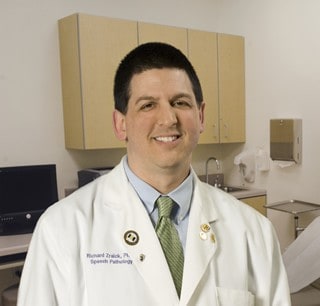When the Professor Becomes the Patient
| Knowing his grandmother lost her sight in the 1960s due to glaucoma, Richard Zraick, Ph.D., sought the best in eye care after he became an adult. And when he became a professor of speech-language pathology in the College of Health Related Professions at UAMS in 1997, Richard had no idea just how much he would need the technology and expertise of the doctors at the Jones Eye Institute.
“My eyes are a huge part of what I do as a professor. My teaching, res earch and patient-care responsibilities all depend on me having good vision,” Richard said. After he joined the faculty at UAMS and learning that UAMS doctors have a great reputation in the medical community, he became a patient at the Jones Eye Institute.
earch and patient-care responsibilities all depend on me having good vision,” Richard said. After he joined the faculty at UAMS and learning that UAMS doctors have a great reputation in the medical community, he became a patient at the Jones Eye Institute.
Following several years of routine eye exams to monitor his glaucoma, Richard had an urgent issue with his vision one day. Knowing that he needed urgent medical care, Richard was relieved to be referred by his Jones Eye Institute ophthalmologist to a retina specialist on the same day. After Richard’s detached retina was repaired at Jones Eye Institute, hewas advised that the other retina would likely detach in the future, and a second detached retina was later repaired successfully.
In the years following his retina surgeries, Richard developed cataracts in both eyes that were surgically treated using state-of-the-art ultrasound technology. Dr. Wiggins, a comprehensive ophthalmologist who specializes in cataract surgery, says, “Not all cataracts are age related. Some are caused by medications, trauma or are present at birth. Having cataracts develop after a major retina surgery is a known occurrence.”
“I’ve never seen better in my entire life. My grandmother visited many of the top specialists in New York and Boston, and I believe her sight could have been saved if the science and technology at UAMS had been available to her.”
Richard is grateful to be under the ongoing care of Dr. Wiggins and appreciates the great job he is doing overseeing the UAMS Ophthalmic Medical Technology (OMT) Program. ”As a College of Health Related Professions faculty member, it is nice to experience firsthand how well-trained the OMTs are because of the efforts of Dr. Wiggins and his colleagues,” says Richard. He adds, ”Many times when I was seen by Dr. Wiggins he was accompanied by OMT students, and I’m glad I got to contribute firsthand to their education.”
Since Richard now uses eye drops to control his glaucoma and uses only over-the-counter reading glasses, his patients and students may not imagine how much the professor needed high quality eye care. “I’ve received excellent care from the Jones Eye Institute staff across the board, from the nurses who coordinated my surgery to the ophthalmology techs who worked alongside the doctors. From the minute I came in to the institute, staff members were concerned about my eyes and well being, and I have had seamless eye care throughout my 13 years as an eye patient at UAMS.”